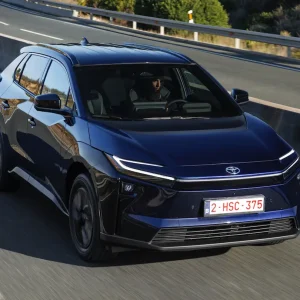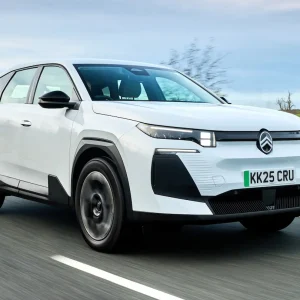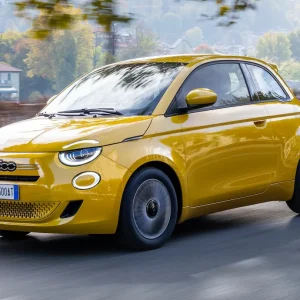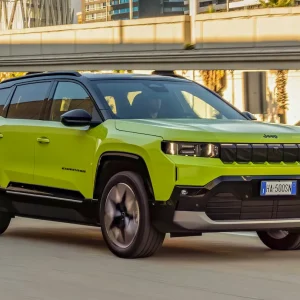Just like the recently launched Volkswagen ID.5 EV that is essentially a coupe version of their ID.4 SUV, the iconic German brand seems to be segment filling in the same way further down the range. Similar to the ID.5, the new Taigo is basically a coupe version of their smallest SUV, the T-Cross.
Whereas the ID.5 seems very digital and state-of-the-art, the Taigo feels very much at the other end of that spectrum – and in some ways is better for it.
Outside, from the front, it is identical to the T-Cross. The same is true of the side, until you get to the C-pillar, where it gets curvier. The Taigo is identified at the back by its distinctive badging, the darkened rear light bar that stretches across the boot and the larger rear glass area. That longer rear overhang is the main reason why this Volkswagen is 150mm longer than the T-Cross. Overall, the Taigo has a more stylish shape than the T-Cross, that suits bright colours and the standard alloy wheels of our Style test car.
Inside, the Taigo is much the same as the T-Cross on which it is based. After the simplicity of the latest ID models interiors, the Taigo’s interior feels like a Volkswagen from a generation back and in our opinion is better for it. There are no annoying and confusing haptics on the steering wheel, plus simple controls for the infotainment. In fact, the more modern climate controls with their sliders are the only part of the switchgear that annoys.
It also feels as robustly put together as you’d expect a Volkswagen to be, but in our opinion there’s too much hard, scratchy plastics for a car costing the thick end of £28,000.
Still, the driving position, supportive seats and overall visibility are good. Plus, that extra rear overhang means that headroom is not affected in the back by the curvier rear styling and boot space which is only slightly smaller at 440 litres than the T-Cross.
Considering the Style trim is mid-spec, it gets plenty of standard equipment; most welcome during the time we had the car were the automatic LED headlights, rain-sensitive windscreen wipers and adaptive cruise control. Although Volkswagen maintain the entry-level ‘Life’ trim will be the best-seller.
Like the T-Cross on which it’s based, the Taigo is a very safe car, with the same five-star score, which is no surprise when you consider standard items include automatic emergency braking, lane-change side assist, hill start assist and even an alert system that can detect if a driver is tired.
Our test car mated the 110hp, 1.0-litre TSi petrol with DSG automatic transmission. We are not sure if it is the result of emissions regulations, or a problem with this test car, but this engine felt so disappointingly sluggish from start off that we ended up driving in ‘Sport’ mode just to make the Taigo more urgent at junctions and when joining around roundabouts. That said, once on the move, like all other DSG transmissions, it is quite happy to rifle through all seven-gears and feels reasonably willing. Also, from a BIK point of view, choosing the auto adds 2%, taking it from 29 to 31%. The auto is also thirstier, being capable of 47.9mpg versus the manual at 52.3mpg.
Dynamically, the Taigo feels very safe. Although the pleasing direct steering surprises with how precise it is and almost seems at odds with the rest of the car. The 17in alloy wheels give plenty of grip, yet at the same time equal a comfortable ride. However, if you are after a keener drive, one of our favourites, the Ford Puma might be a better option.
Even though it’s basically a T-Cross with a more stylish rear, there’s still lots to like about the Taigo. It is comfortable and competent to drive, has a practical and spacious and well-equipped interior. Plus, it should be cheap to run. Although, for a Volkswagen the hard plastics in the interior disappoint and we wonder if the manual transmission might be a better bet in terms of the slightly reduced running costs, and hopefully improved performance.
Volkswagen Taigo 1.0TSi 110 DSG Life
P11D: £25,270
Residual value: 41.7%
Depreciation: £14,720
Fuel: £9,243
Service, maintenance and repair: £1,790
Cost per mile: 42.92p
Fuel consumption: 47.9mpg
CO2 (BIK %): 134g/km (31%)
BIK 20/40% a month: £130/£261
Luggage capacity: 440 litres
Engine size/power: 999cc/110hp





